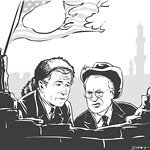Point Austin: Meanwhile ...
Approaching Memorial Day, something else to consider
By Michael King, Fri., May 23, 2008

It is difficult to comprehend such numbers, even accompanied by the heartrending film of parents mourning their lost children or when assaulted by the screaming crawlers at the bottom of the TV screen. And in the days since the disasters, I've found myself wondering about something else. Why, after more than five years of war and with more than 130,000 U.S. troops still on the ground in Iraq, is it impossible for the occupying armies – not to mention their allied international news services – to report, on any consistent basis, even remotely accurate estimates of Iraqi casualties?
For natural disasters, the networks are only too eager to blare dramatic numbers of dead and injured, with periodic updates – and to speculate eagerly on the role of the Myanmar or Chinese governments in assisting or obstructing aid to those affected. On Iraq – for which the U.S. government bears direct, ongoing responsibility as an invading and occupying power – the best our mainstream news sources can spare are maudlin recitations of lists of deceased U.S. soldiers.
Some deaths are more equal than others.
Who's Counting?
Still, the most authoritative estimates we have of Iraqi civilian deaths are the 2004 and 2006 studies performed by Johns Hopkins University in Baltimore and Baghdad's Al Mustansiriya University, published in The Lancet medical journal. The 2006 study, using standard statistical methods of random cluster surveys throughout Iraq, estimated 650,000 excess civilian deaths since the 2003 invasion (90% from violence); two years and many bloody battles later, that number is undoubtedly low and doesn't even address the millions of people forced into desperate exile. If there's been much media reporting on the meaning of those numbers (let alone even feeble attempts to verify them), I've missed it. On one or two occasions, President Bush or a U.S. general was given an opportunity to dismiss (without counterevidence) the estimates as "not credible," and that's about it.
In March, Les Roberts, the epidemiologist who co-authored the Lancet study, was given a rare interview by the Chicago Tribune. He pointed out that the study conforms to similar wartime estimates elsewhere and that the Iraqi government's own numbers are catastrophic, and he criticized the collective silence of our leaders on the consequences of our actions in Iraq.
"If we think of the 9/11 attacks on New York and realize that Iraq has just about the same population as the greater metropolitan New York area," Roberts told the Tribune, "this new report [January 2008] from the Iraqi government suggests they experienced violent deaths equal to two 9/11 attacks per month for the first three years of occupation. That's according to the Iraqi government! Our study suggests the equivalent of six 9/11 attacks per month.
"Whether this was from the actions of our nation or the indirect and unforeseeable consequences of the invasion is of little importance. There is no question that hundreds of thousands have died. Which of our leaders has expressed contrition for this? I fear that pride and political bravado on this issue are creating a role for us in the world that is almost the opposite of how we see ourselves."
Defining Questions
Meanwhile, the presidential campaign debate over our Middle East policy proceeds within very narrow parameters, and the ongoing devastation to Iraqis forms very little part of it. In recent weeks, the argument has perceptibly shifted toward possible U.S. attacks on Iran, more specifically toward which of the candidates is sufficiently bellicose toward a country whose role in the Iraq violence, compared to our own, is minuscule, and whose military spending is less than 1% that of the United States. And while that carefully limited "debate" proceeds, the Bush administration, with bipartisan support, is already funding a covert war inside Iran (Andrew Cockburn, "Secret Bush 'Finding' Widens War on Iran," Counterpunch, May 2).
Bush and John McCain attack Barack Obama for supporting "appeasement" with Iran, and Obama responds that Iran, while very dangerous, is not as dangerous as the Soviet Union. Not to be outdone, last month Hillary Clinton proudly declared that should Iran attack Israel, the U.S. should "obliterate" Iran. Any public debate, or even an occasional reporter's questions, about current illegal U.S. attacks against yet another country? Silence. Any public misgivings about current Israeli attacks on its own neighbors (e.g., Syria)? Silence.
It's also far more likely that Israel (which possesses nuclear weapons) may attack Iran (which has none), as it has indeed done before. Does it occur to any of those national reporters on the campaign trail to ask the candidates how the U.S. should respond to a unilateral, "pre-emptive" Israeli attack on Iran (which likely couldn't occur without at least tacit U.S. approval)? Should we respond to any such violation of international law by "obliterating" the attackers?
Such questions, of course, are virtually unthinkable. They are certainly unspeakable within a mainstream political discourse that determines fitness for national office largely on the basis of a willingness to wage declared or undeclared war against any country that fails to bow to U.S. priorities and power.
For the rest of us, they are questions to ponder as we enter the season of warrior memorials, and the stretch run of a political campaign likely to be centrally defined as a choice between war and peace.
Got something to say on the subject? Send a letter to the editor.










